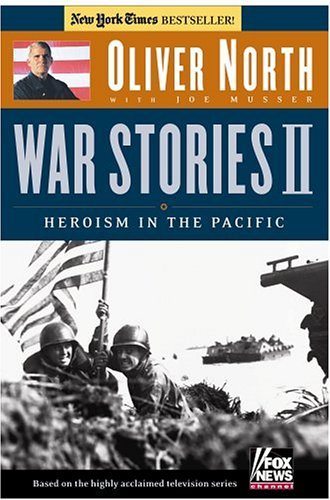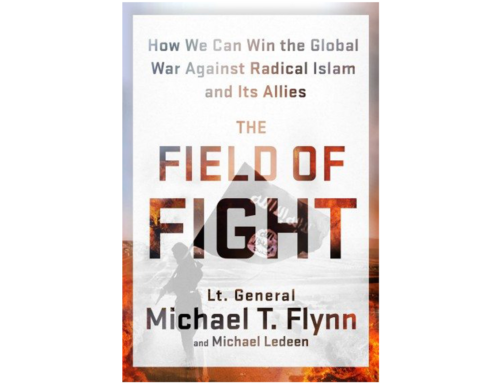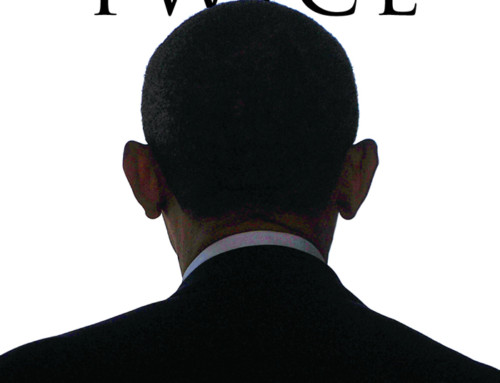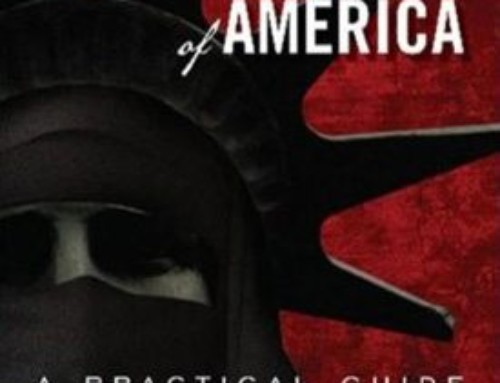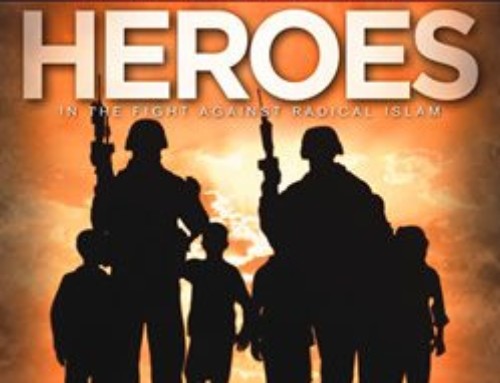With the reelection of George Bush, the world has been put on notice that his doctrine of preemption will stay in place and that the U.S., in waging war on terror, will stay on offense. If new theaters are opened and the conflict widens or worsens, it’s apparent the country’s mettle and resolve will be tested. And that is where books like Oliver North’s War Stories from the Pacific Theater of World War Two are important. They are important because in times of terrible sacrifice, we need to be reminded of the immutable laws that have governed humanity and war since ancient times; those principles still extent in the Second World War when our recent forbears paid such an enormous price to preserve our freedom.
In his War Stories, North proves a worthy heir to the long line of military historians that begins in the West with Herodotus, the man who chronicled the Persian invasions of Greece in the 5th century B.C. Considered also our father of history, he traveled throughout the Aegean region after the Persians were driven out, and gathered eye-witness accounts so that he could record not just events and battles but so that he could also comment on culture. He coined the phrase, custom is king meaning that little is innate to human nature. Rather, we are conditioned by culture. For him, the Persian Wars were a massive confrontation between two antithetical cultures, one based on liberty and equality before the law, the other, hierarchical, where all were subservient to the King.
The reader will find many of the elements and themes in War Stories reminiscent of the first master, Herodotus. North’s narrative covers the major campaigns of the Pacific, beginning with Pearl Harbor and ending with Mac Arthur’s occupation of Japan, and is also the account of a massive confrontation between antithetical systems, augmented as well by riveting eye-witness accounts.
“I remember vividly my first mission…Suddenly about sixty Zeros appear. There’s probably thirty or so of us from various squadrons. So airplanes are all around. You look off to the left, there’s airplanes going down in flames. There are planes crossing twenty feet in front of you…I’m scared to death. My mouth was so dry, if you’d have called me on the radio, I couldn’t have answered you.”
Lieutenant Thomas Emrich, USMC Vella Lavella Island, 29 Oct. 1943
The reader of War Stories is also reminded that conflicts through the ages have often been characterized by a clash of civilizations where the unlikely victors will marshal some superior cultural element that enables them to overcome seemingly insurmountable odds. After a year of defeats, on the 7th of August, 1942, Allied “leathernecks” captured an airfield (they renamed Henderson Field) on Guadalcanal at the lower end of the Solomon Islands. The Japanese were planning to use the airstrip as a needed refueling base for aircraft, fighters and bombers, in preparation for the invasion of Australia and ultimately a total domination of the Pacific. It was the first beachhead captured by the Allies inside any portion of the new Japanese Empire. Our men on the ground were the first inside enemy lines and ominously their whereabouts were well-known.
As the free men of Greece were able to drive the million-man Persian army and navy across the Hellespont, and back into Asia, the men of Guadalcanal somehow were never overrun. Night after night in late 1942, they held the high ground next the airfield and fought off wave after wave of suicide charges, sometime outnumbered 600 to 1!
I found out I was the only officer left in the company. Red Mike said, “You’re now the CO. Take over.” …About two o’clock in the morning, the Japanese commander decided he was going to make a break for it and attack A Company’s flank……Then it was hell…The bonsai charge was a lot yelling and enough to scare anybody, except the people who were able to keep their cool and keep their ammunition going.”
Captain John Sweeney, USMC Edison Ridge, Guadalcanal, 13 Sept. 1942
Huge naval and air battles took place in the waters off Guadalcanal as the Americans struggled to supply and reinforce the Allies who refused to give up their hold inside one tiny part of Japan’s empire. And six months after our initial landing, the Allies still held the island airfield although we had lost 1,600 lives, twenty-four ships and 600 aircraft. The Japanese had lost 25,000 lives and twenty-four ships including irreplaceable carriers and battleships. It had literally been the most momentous and pivotal military campaign up to its time, in human history. North provides a quote from Admiral Halsey for the ages, “Before Guadalcanal, the enemy advanced at his pleasure. After Guadalcanal, he retreated at ours.”
North reminds his reader throughout his story how different from ours was the culture of the Japanese soldier. The enemy would nearly always fight to the death rather than suffer the dishonor of surrender. And he had contempt for any prisoner who fell into his hands. This led to the atrocities committed on the Bataan death march and in the slave labor camps throughout the Pacific theater. My only criticism of North’s epic is that I wondered what light he could shed on the puzzling question of what cultural element gave the Americans and their allies the ability to defeat an enemy civilization so utterly different, one of such militarism, such dedication to its cause and its culture, and one so utterly ruthless.
I would recommend War Stories to the student of warfare who is interested in what lessons it can impart to us now that we’re engaged in this war on Islamic terror. I found numerous lessons.
The President’s opposition has accused him of not putting enough troops into Iraq in order to quickly subdue all the insurgents. One lesson that we may need to relearn is that, even with a winning strategy, costly mistakes will nearly always be made. This is due to the fact that, in war, one is fighting a thinking enemy that urgently wishes to survive. Few historians will fault FDR for not conceiving and implementing a winning strategy for defeating Japan. However, North reminds us that the cost in lives lost in the capture of a tiny atoll, Tarawa, made it by today’s standards, not just a mistake but an unmitigated disaster.
Part of a string of tiny atolls that are the Gilbert Islands, Tarawa is smaller in square area than the Pentagon and its parking lots. But the Japanese had an airstrip there that the war planners felt had to be eliminated. The island was defended by 5,000 elite, battle-hardened naval infantrymen and a 1,000 conscripted Koreans who had constructed incredibly durable concrete blockhouses and machine gun and mortar emplacements all of which survived the pre-invasion bombardment. To make matters worse, the Japanese commander knew something that the Americans did not. The reef surrounding the island would prevent landing craft from crossing except at high tide. The invasion took place at low tide causing all the men to disembark out on the reef and where they were in range of withering machine gun fire and mortars.
“I was twenty-two, almost twenty-three. I was leading guys who were seventeen and eighteen…I was around 600 yards out in the water when I was hit very seriously in the abdomen. And of course nobody’s supposed to stop for the wounded. Everybody’s got keep going. But one of my men, Private Sullivan, started to drag me over to one these landing craft where the ramp was down. Eddie Albert, the famous movie actor, had brought one of the LCVP’s to pick up the wounded. And someone says, “You’re gonna make it.”
Lieutenant Dean Ladd, USMC Tarawa Atoll, 21 November, 1943
For those today who think the Iraq war is going badly, it is instructive to consider that, in the two and a half days of fighting on Tarawa, 6,000 were killed. All 5,000 Japanese defenders were killed. The U.S. lost 1,000 Marines and 1,500 wounded.
Eddie Albert, already a successful movie star at 33 years old, volunteered for the Navy after Pearl Harbor. Under fire, he made 26 trips to the beaches of Tarawa to evacuate the wounded. He was awarded a Bronze Star for Valor. The lessons for and about today’s Hollywood elites and their relative devotion to country hardly require further expansion.
Another lesson we can take from War Stories has to do with dangers inherent in our adversarial, some might say, perfidious free press. Many have been appalled by the way our own mainstream press has covered the war in Iraq, the endless stories about the abu Ghareb scandal are only one example of its anti-war bias. Early in the darkest most dangerous beginning of the war, North’s reader learns that U.S. was able to win the battle of Midway, because we had broken the Japanese code which shifted the element of surprise to us. However, word of this was leaked to one of FDR’s political adversaries, Robert McCormick, who owned the Chicago Tribune, and who made it front page news across the country. The Japanese quickly responded by changing their communication codes which no doubt caused inestimable loss of life. Perhaps North has reminded us that the responsibility of the press in a free society during wartime is still an open question.
Many pundits particularly those who are opponents of President Bush have argued that we have no reason to expect that we will be successful in remaking the Middle East, fundamentally changing a culture that has been largely antagonistic toward the West for over 1,300 years. The answer to whether the Bush plan is possible can be found in North’s last chapter which he titles, MacArthur and War’s End.
Although the Allied leaders, on July 17th, 1945 issued the Potsdam Declaration demanding Japan’s unconditional surrender, the reader learns that privately Stalin and even Churchill tried to talk Truman out of this position. In fact, Stalin was secretly plotting with Japan to ally with her if an armistice could be negotiated.
Truman was the wisest. He reasoned that if we were to coexist with a peaceful Japan, we would have to replace its centuries-old feudal/imperial system with a democracy. Japan’s warlords rejected surrender terms in favor of a national suicide pact. Matching Japanese ruthlessness with an even greater ruthlessness, six days later the first atomic bomb was detonated over Heroshima. It has been nearly 60 years since Japan adopted a new culture, governed by a democratic constitution and, so far, it has remained a trusted ally and the peace has held.
NOTE: Publication: Human Events
